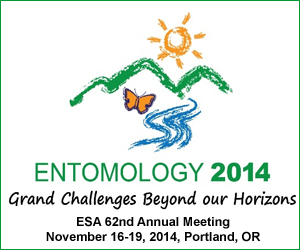Molecular Systematics of the Subfamily Phasiinae (Diptera: Tachinidae)
Molecular Systematics of the Subfamily Phasiinae (Diptera: Tachinidae)
Monday, March 3, 2014
Embassy Ballroom Prefunction (Embassy Suites Greenville Golf & Conference Center)
The subfamily Phasiinae (Diptera: Tachinidae) is composed of obligate endoparasitoid flies that attack heteropteran insects, many of which are important agricultural pests. The phylogenetic relationships within the Phasiinae were explored using nucleotide sequences of two genes, CAD and LGL. A total of 63 taxa for CAD and 73 taxa for LGL were included in the analyses, representing 58 genera. Maximum likelihood inference methods were employed to reconstruct phylogenetic relationships in separate analyses of each gene and in a combined dataset. Phylogenetic reconstructions generally supported recent morphological classifications based on oviposition strategies and postabdomen characters. All tribes in Phasiinae were recovered as monophyletic or could become so with minor changes to current classification schemes. Tachinidae was recovered as a monophyletic family, and the monophyly of the subfamilies Tachininae, Exoristinae, and Phasiinae was resolved with varying levels of statistical support. Dexiinae was paraphyletic. Significant results include the following proposed taxonomic revisions: 1) Removing Litophasia from Catharosiini, 2) Transferring Euclytia, Eliozeta, Ectophasia, and Clytiomya from Phasiini to Gymnosomatini, 3) Including Strongygaster and Rondaniooestrus in Phasiinae, 4) Placing Rondaniooestrus and Opesia in Strongygastrini, and 5) Including Litophasia, Euthera, and Epigrimyia in Dexiinae.
<< Previous Poster
|
Next Poster


